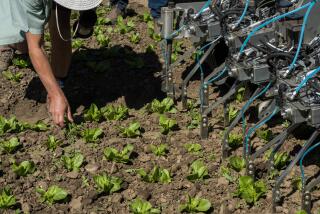Creates Sweeter Carrots, Searches for the Perfect Tomato : High-Tech Firm Focuses on Food
- Share via
CINNAMINSON, N.J. — High technology has ventured into the vegetable fields as scientists try to put more snap and sweetness in carrots, find the perfect tomato and create celery with no strings attached.
In the laboratories and greenhouses of its sprawling headquarters, DNA Plant Technology Corp. applies plant genetics to develop vegetables with desirable characteristics such as resistance to disease or improved texture and flavor.
Using nutrients to promote cell growth in tissues placed in laboratory dishes, the scientists can obtain up to 10,000 plants from a single leaf, and then identify and breed the ones with superior traits.
The company’s process, called “somaclonal variation,” is similar to the centuries-old use of crossbreeding to obtain a variety of plants, but is much faster and has a somewhat different aim in mind.
Works for Consumer
“Most of the plant breeding in the past was for the benefit of the farmer, improving things like crop yield,” said John Marsden, the company’s executive vice president. “Our work is mostly for the consumer.”
The company plans to put its first product on the market early next year, three-ounce packages of celery and carrot sticks called “VegiSnax.” Marsden said the scientists tailored the vegetables to consumer preferences by making the carrots sweeter and taking the annoying strings out of celery.
VegiSnax will be test-marketed under an agreement with Kraft Inc. and will be sold in packages designed to give the snacks a shelf life of five weeks, company officials said.
“The snack food industry is a booming industry, yet the consumer trends are toward good health,” Marsden said. “We thought we should be able to combine them. This is something that could go in your briefcase, go in your purse, go in your lunch box. . . . It can be eaten on the run.”
DNA Plant Technology started in 1981 the same way many high-tech electronic firms have sprouted, with a pair of enterprising scientists trading the security of regular paychecks for the chance to test their skills in the marketplace.
When William R. Sharp and David A. Evans submitted their resignations to Campbell Soup Co., their bosses were more intrigued than upset. Campbell invested heavily in the new company, providing a 32-acre site for its headquarters in exchange for stock and signing a $2.4-million contract for researchers to develop improved tomatoes.
Improved Tomatoes
While the bulk of the new company’s research has involved improving coffee and cacao trees, corn stalks and other plants for customers who like to keep the projects confidential, Campbell has been quite open about what it wants from the laboratory--tomatoes that can be grown all year with consistently good flavor and color.
“Wouldn’t it be great if you could go into the store in January and buy a big, fat tomato?” asked Jim Moran, a spokesman for Camden, N.J.-based Campbell.
DNA Plant Technology officials, sensitive to public uneasiness that has accompanied the introduction of genetic engineering in agriculture, say their process is natural and involves no splitting of genes or cloning of cells.
“It’s just a development of the selection process,” Sharp said. “Farmers have been doing this for years. What we’re doing is building on the hard work they’ve done.”
More to Read
Inside the business of entertainment
The Wide Shot brings you news, analysis and insights on everything from streaming wars to production — and what it all means for the future.
You may occasionally receive promotional content from the Los Angeles Times.










